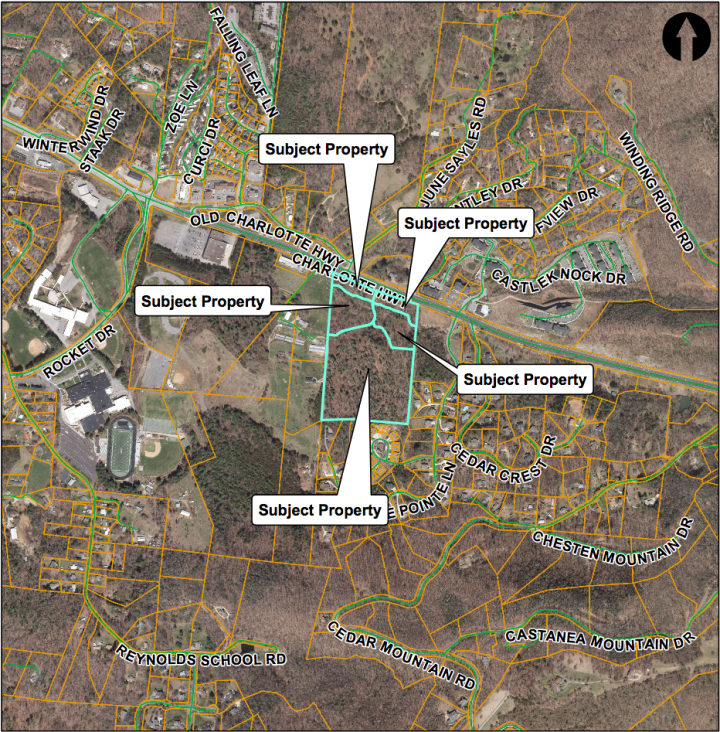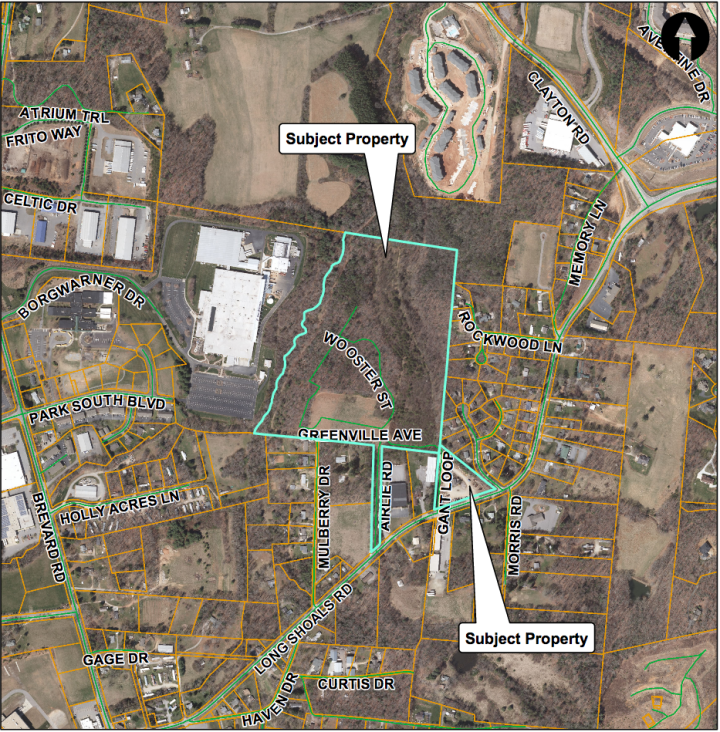In a familiar scene, a crowded room of Buncombe County residents showed up to outline concerns about how a proposed apartment complex would change the character of their community. Over the course of the year, the Board of Adjustment has heard many of the same issues about development from citizens living in numerous parts of the county. Its answers to those concerns have largely been stock responses sounding the drumbeat of the board’s limited scope of power while imploring residents to reach out to other organizations for answers. The Board of Adjustment meeting on Sept. 13 played out much the same as nearly 700 apartment units gained approval to move forward.
Community reservations
Residents from the Fairview community, on the edge of East Asheville, showed up to plead their case against The Reserve at Charlotte Highway, a 214-unit apartment complex on a 22 acres at 251 Charlotte Highway. The area is zoned Neighborhood Service District which allows for: “A mix of residential, commercial, business and service uses in limited areas along major traffic arteries,” according to the county’s zoning ordinance. The project needed a conditional use permit as it is considered a Planned Unit Development, Level I and would have more than eight buildings.
Bob Grasso, the architect landscape representing the developer, told the board, “We tried to bring all the buildings toward the interior of site… . As far as traffic, we will be getting with the [N.C. Department of Transportation] after this meeting. We will do traffic counts and the NCDOT will make recommendations for improvements, if any.” He also noted he will minimize land disturbance by keeping half of the 22 acres intact and increase landscape buffers as much as possible.
Bob Oast, an attorney hired by some residents of neighboring Village Park, outlined his case that the apartment complex would change the character of the neighborhood, citing traffic and property value loss as two major factors. “We are aware this is a commercially zoned area. The purpose of the conditional use process is to ensure compatibility and we think it could be better, more compatible,” he argued.
“We first learned of this just last Wednesday. What is submitted is almost an insult,” implored Frank Dupont, a representative of the Village Park homeowners association. “As a group we came up with list of concerns: noise pollution, light pollution, loss of privacy, the height of the buildings, traffic, the impact on property values, blasting during construction and rainwater drainage. In some instances the developer can mitigate those factors.”

Jack McCarthy, another Village Park resident, continued to stress the traffic issue. “To pull out on our roads every morning, it’s just dangerous and very frustrating for people. Add another 200 more people… there’s going to be more accidents,” he said. “The value of the complex coming in will destroy our property values. We’ve all got acreage and want the view. I’ve paid my taxes to live in this beautiful place… . We want Mayberry, we don’t want Raleigh.”
Ann-Patton Hornthal, a resident of neighboring Cedar Crest, made a presentation hitting many of the same notes previous speakers sounded. “The NCDOT is bound by guidelines. When a project has less than 400 units it does not trigger a mandatory study. This is an opportunity to make sure a proper study is done,” she said while asking the board to require a traffic study before approving the permit. Further, Hornthal requested the permit be tabled until 90 days after the study would be complete.
“You imagine we have more power than we do,” replied Board Chair George Lycan. “Your points are valid… . It may be that they are not going to do an in-depth analysis, but that’s how we have to do business,” he said, adding that in order for the apartment complex to receive its driveway permit, it will have to satisfy NCDOT requirements.
Hornthal replied that the board is the gatekeeper for mitigating traffic woes. “It is the developer’s burden to address traffic and I don’t think they have. We should not have comfort the NCDOT will do this for us,” she argued.
Board members then sought clarity from County Attorney Brandon Freeman, who advised, “When you make the determination, you have to rely on competent evidence.” He then cited zoning ordinance language, telling the board it must find that, “Particular attention has been paid to automotive and pedestrian safety and convenience, traffic flow and control.”
Lycan asked, “How do you imagine we have confirmation?”
Freeman replied, “That is the plain reading of the statute. The finding is not whether the project affects traffic, but was particular attention paid to automotive and pedestrian safety and convenience?”
Lycan questioned what results a traffic study conducted by an independent engineer might conclude. “I have every reason to believe that it will be a positive report. It will probably not have a lot of negative in it. It will say traffic will flow. That is what they are hired to do,” he reasoned.
However, County Planner Debbie Truempy was quick to note that traffic studies are sealed, “So they don’t just say what the developer says.”
Grasso also noted he’s added traffic mitigation on past projects based on study results.
Board member Cindy Weeks said past developers haven’t been required to provide a traffic study as a condition for permit approval. “It’s very difficult, without the Board of Commissioners, for us to require [a traffic study] for this one project. I wouldn’t feel comfortable doing that myself,” she argued.
“We can’t make them do traffic study,” added board member Lisa Stephens. “The driveway permit itself makes them do a traffic study. In the last five months I’ve seen NCDOT require turn lanes.” Stephens also argued that the board is not responsible for ensuring property values don’t decline. “Property value is not part of our purview. It’s about looking at damaging people’s property, not the values.”
In regard to other concerns, Lycan added that there are built-in safeguards via county inspections. “From where we operate I feel we have to approve this. The general concept is we have agencies to cover these things. The driveway permit holds the developer’s feet to the fire.”
Other board members sympathized with traffic concerns but didn’t find valid grounds to postpone or deny the permit. The board then unanimously approved the project.
Long shot

The second apartment complex up for consideration was Long Shoals Apartments. The project features 472 units and 15,000 square feet of commercial space on 42 acres of land at 556 Long Shoals Road, on the edge of South Asheville. It previously received a conditional use permit but slight alterations to the plan required the developer to reapply.
Chris Day, a civil engineer representing the developer, told the board some buildings were moved due to rock encountered during site preparation. He also noted the NCDOT is requiring the addition of a right turn lane.
David Seligman, a nearby resident, was the only person to speak against the project. “Our concern is Long Shoals Road is already crowded as is. Adding 462 cars… we are going to jam-pack it even more,” he said, noting the added right turn lane would only be a “Band-Aid.” Seligman went on to express confusion about reaching out to the NCDOT only to have that organization refer the issue to the Board of Adjustment. “When an accident happens, I’m going to come back and quote this meeting. You are passing the buck to NCDOT and they pass the buck to you. It will be on your head.”
Lycan agreed that the apartment complex would create additional traffic stress. “We don’t have the power to shut down business development. We see if it complies with the ordinances that exist. If it meets the bar we have to agree. A big item of concern is the traffic situation. We depend on input from people, primarily NCDOT,” he explained.
The board then unanimously approved the conditional use permit.
The Buncombe County Board of Adjustment is set to meet next on Wednesday, Oct. 11.



If your only perspective to the world is through an automobile windshield then you are missing the big picture. Our society has been so heavily influenced by the automobile culture we have forgotten that it is only one form of transport, not the only one and surely not the best.
We need housing and the active transportation system to support the people who live in them. It should not be a necessary requirement for someone to own an expensive car just to get around the relatively short distances of our small city. A bicycle trip from North to South Asheville only takes a little over an hour for a reasonably fit individual. The bus ride is closer to an hour and a half and would be faster if the connection between the two bus lines were better.
The solutions are not that difficult or technical. Cities around the world have successfully addressed these issues and so we don’t have to reinvent the wheel just follow the proven strategies.
Change is inevitable so if you want to live in Mulberry, move to Mulberry otherwise stay put and enjoy the benefits of progress
Mayberry not Mulberry…wth is Mulberry…come on?!?
No idea where Mulberry came from. But coincidentally Wiccapedia states Mulberry is a census-designated place in Wilkes County, North Carolina. The population was 2,332 at the 2010 U.S. Census. The community was given its name by the first European pioneers to settle the area in the 1750s. Sounds just like Mayberry. Either way cars are a burden to sustainable society.